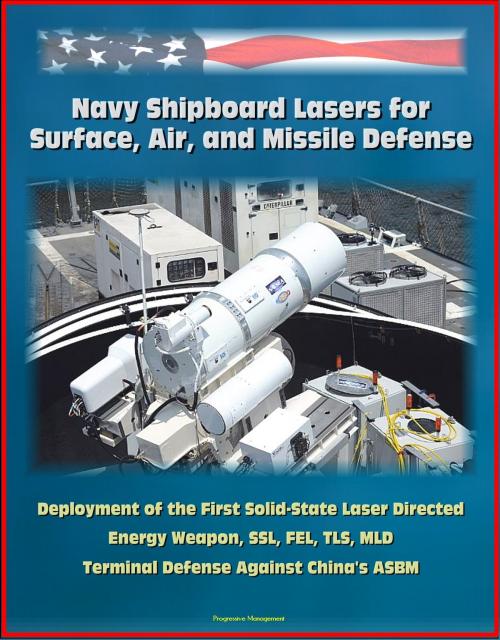Navy Shipboard Lasers for Surface, Air, and Missile Defense: Deployment of the First Solid-State Laser Directed Energy Weapon, SSL, FEL, TLS, MLD, Terminal Defense Against China's ASBM
Nonfiction, Science & Nature, Technology, Lasers, History, Military, Naval| Author: | Progressive Management | ISBN: | 9781301193592 |
| Publisher: | Progressive Management | Publication: | April 9, 2013 |
| Imprint: | Smashwords Edition | Language: | English |
| Author: | Progressive Management |
| ISBN: | 9781301193592 |
| Publisher: | Progressive Management |
| Publication: | April 9, 2013 |
| Imprint: | Smashwords Edition |
| Language: | English |
Navy officials announced in April 2013 that a solid-state laser would be deployed onboard the U.S.S. Ponce, providing the first at-sea demonstration of a revolutionary directed energy weapon. The demonstration is part of a wider portfolio of near-term Navy directed energy programs that promise rapid fielding, demonstration and prototyping efforts for shipboard, airborne and ground systems. The Office of Naval Research (ONR) and Naval Sea Systems Command recently performed demonstrations of high-energy lasers aboard a moving surface combatant ship, as well as against remotely piloted aircraft. Through careful planning of such demonstrations and by leveraging investments made through other DoD agencies, researchers have been able to increase the ruggedness, power and beam quality of lasers, more than doubling the range of the weapons.
This ebook includes a detailed report on the laser program, Navy Shipboard Lasers for Surface, Air, and Missile Defense: Background and Issues for Congress. Contents include:
Scope, Sources, and Terminology * Background * Shipboard Lasers in General * Potential Advantages and Limitations of Shipboard Lasers * Potential Targets for Shipboard Lasers * Required Laser Power Levels for Countering Targets * Types of Lasers Being Developed for Potential Shipboard Use * Fiber Solid State Lasers (Fiber SSLs). * Slab Solid State Lasers (Slab SSLs) * Free Electron Lasers (FELs) * Navy Surface Fleet's Generalized Vision for Shipboard Lasers * Remaining Technical Challenges * ONR Solid-State Laser Technology Maturation Effort * Naval Directed Energy Steering Group * Directed Energy Vision for U.S. Naval Forces * Destroyers and LCSs Reportedly Leading Candidate Platforms * FY2012 Congressional Report Language * FY2012 National Defense Authorization Act (H.R. 1540/P.L. 112-81) * FY2012 Military Construction and Veterans Affairs and Related Agencies * Appropriations Act (H.R. 2055/P.L. 112-74) * FY2013 Funding Request * Issues for Congress * Program of Record and Roadmap * Arguments Against Developing a Roadmap or Program of Record. * Arguments Supporting Developing a Roadmap or Program of Record * Number of Laser Types to Continue Developing * Potential Strategies * Relative Merits of Laser Types * Implications for Ship Design and Acquisition * Options for Congress * Legislative Activity for FY2013 * FY2013 Funding Request.
"The future is here," said Peter A. Morrision, program officer for ONR's Sold-State Laser Technology Maturation Program. "The solid-state laser is a big step forward to revolutionizing modern warfare with directed energy, just as gunpowder did in the era of knives and swords."
Officials consider the solid-state laser a revolutionary technology that gives the Navy an extremely affordable, multi-mission weapon with a deep magazine and unmatched precision, targeting and control functions. Because lasers run on electricity, they can be fired as long as there is power and provide a measure of safety as they don't require carrying propellants and explosives aboard ships.
Navy officials announced in April 2013 that a solid-state laser would be deployed onboard the U.S.S. Ponce, providing the first at-sea demonstration of a revolutionary directed energy weapon. The demonstration is part of a wider portfolio of near-term Navy directed energy programs that promise rapid fielding, demonstration and prototyping efforts for shipboard, airborne and ground systems. The Office of Naval Research (ONR) and Naval Sea Systems Command recently performed demonstrations of high-energy lasers aboard a moving surface combatant ship, as well as against remotely piloted aircraft. Through careful planning of such demonstrations and by leveraging investments made through other DoD agencies, researchers have been able to increase the ruggedness, power and beam quality of lasers, more than doubling the range of the weapons.
This ebook includes a detailed report on the laser program, Navy Shipboard Lasers for Surface, Air, and Missile Defense: Background and Issues for Congress. Contents include:
Scope, Sources, and Terminology * Background * Shipboard Lasers in General * Potential Advantages and Limitations of Shipboard Lasers * Potential Targets for Shipboard Lasers * Required Laser Power Levels for Countering Targets * Types of Lasers Being Developed for Potential Shipboard Use * Fiber Solid State Lasers (Fiber SSLs). * Slab Solid State Lasers (Slab SSLs) * Free Electron Lasers (FELs) * Navy Surface Fleet's Generalized Vision for Shipboard Lasers * Remaining Technical Challenges * ONR Solid-State Laser Technology Maturation Effort * Naval Directed Energy Steering Group * Directed Energy Vision for U.S. Naval Forces * Destroyers and LCSs Reportedly Leading Candidate Platforms * FY2012 Congressional Report Language * FY2012 National Defense Authorization Act (H.R. 1540/P.L. 112-81) * FY2012 Military Construction and Veterans Affairs and Related Agencies * Appropriations Act (H.R. 2055/P.L. 112-74) * FY2013 Funding Request * Issues for Congress * Program of Record and Roadmap * Arguments Against Developing a Roadmap or Program of Record. * Arguments Supporting Developing a Roadmap or Program of Record * Number of Laser Types to Continue Developing * Potential Strategies * Relative Merits of Laser Types * Implications for Ship Design and Acquisition * Options for Congress * Legislative Activity for FY2013 * FY2013 Funding Request.
"The future is here," said Peter A. Morrision, program officer for ONR's Sold-State Laser Technology Maturation Program. "The solid-state laser is a big step forward to revolutionizing modern warfare with directed energy, just as gunpowder did in the era of knives and swords."
Officials consider the solid-state laser a revolutionary technology that gives the Navy an extremely affordable, multi-mission weapon with a deep magazine and unmatched precision, targeting and control functions. Because lasers run on electricity, they can be fired as long as there is power and provide a measure of safety as they don't require carrying propellants and explosives aboard ships.















